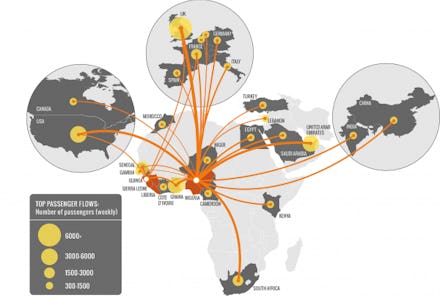Ebola May Spread to America Sooner Than We Think

The news: With news that a third American aid worker returning from Liberia to the U.S. will be treated for Ebola, the question looms large: Could Ebola spread to America?
As epidemiologist Tara Smith previously reported for Mic, Ebola entering the U.S. is not unheard of — but even if it were to happen, there's little to no chance of an outbreak like the one currently spreading throughout West Africa. Given the infrastructure advantages and the relative general health of the American public, the mortality rate would also likely be very low. (In Guinea, Liberia and Sierra Leone, there have been 3,685 cases and 1,841 deaths as of last Sunday, according to the World Health Organization.)
But while the Ebola-infected aid workers have been successfully quarantined, the risk of importing cases of Ebola remains. According to a study in PLOS Currents: Outbreaks published Tuesday, the chance of importing at least one case of Ebola by late September is 18%, as opposed to 5% right now.
What does this mean? The researchers analyzed flight patterns from West Africa and calculated the likelihood of an infected airline passenger unwittingly bringing the virus to another country. Europe and the rest of Africa have higher probability rates than the U.S. does, but as time passes and the virus spreads beyond borders, it becomes more and more likely for Ebola to come to the U.S.
"What is happening in West Africa is going to get here. We can't escape that at this point," Northwestern University physicist Alessandro Vespignani, the senior author on the study, told NPR. "What we could expect, if there is an importation, would be very small clusters of cases, between one and three."
To reiterate, Vespignani is only talking about the likelihood of one or couple of cases of Ebola being imported to the U.S., and nothing on the scale of what is happening in West Africa. Still, the risk cannot be entirely ignored.
How Ebola can spread: Because the average incubation period for Ebola is seven days, it is possible for an airline passenger with no visible symptoms to be infected. While Ebola is usually not transmitted until the patient exhibits obvious signs, the passenger could still bring the virus with them across borders. So far, countries in the infected zone have stepped up travel restrictions and mandatory screenings before flights, but that clearly hasn't been enough.
"I don't trust screening too much," Vespignani added. "It's difficult. Intercepting passengers that are really not sick is not easy."
So what can be done? The key things are awareness and preparation. As of now, a very limited supply of the experimental drug ZMapp remains. Health authorities are looking at rebuilding the stock and pursuing other avenues of treatment in case of future cases.
While the chance of even one imported Ebola case is still pretty low, preparedness doesn't hurt.